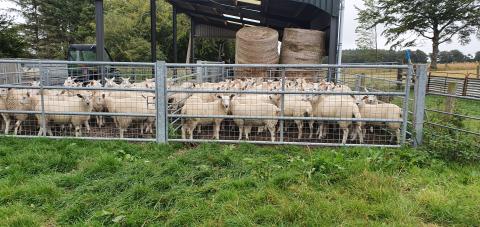Investigating impacts of early life events on subsequent productivity in ewes
Livestock encounter multiple challenges in early life; however, we do not yet understand how these challenges affect the long-term productivity of the animal. This study aims to determine the impact of disease during early life on the longer-term performance of ewes. It is anticipated that ewe-lambs exposed to high levels of disease in their first 12 months will have reduced productivity when they mature.
It is increasingly understood that early life experiences, whether pre- or post-natal, may have long-lasting effects on animals’ behaviour and physiology. Negative post-natal early life experiences such as disease exposure, poor nutrition or parasitism could have adverse impacts not only at the time of occurrence but also in future years. It is becoming apparent that as well as promoting good welfare, minimisation of these negative experiences could contribute to improved performance and resilience of animals in our agricultural systems via a “silver spoon” effect; positive health and welfare in early life being associated with high performance in later life. This study aims to determine the impact of disease in early life on subsequent productivity.

Researchers at MRI have set up a field trial where they will monitor two cohorts, born in 2022 and 2023 respectively, each of approximately 100 lambs, from birth through to their first lambing season. Sheep will be monitored over the duration of the study with faecal samples, blood samples, body weights and welfare scores collected regularly. Birth ease, birth weight, maternal bond and litter size will all be measured at lambing across all years of the study. BioSS have provided statistical support on study design, advising on the balance between maximising the numbers of animals sampled and maintaining a sufficiently high monitoring frequency, so as to optimise the chance of detecting adverse events, all within the logistical constraints of the study. BioSS have supported the project from its earliest phases by providing initial analyses and graphical summaries of the data throughout the first year of data collection, allowing any potential issues in the data collection procedures (e.g., anomalous body weight recordings) to be identified at an early stage. These preliminary analyses have suggested that animals with higher weights at, and shortly after, turnout may be more likely to maintain higher weights throughout the first season. There was also evidence suggesting a negative relationship between nematodirus and strongyle egg counts (these being strongly correlated with each other) and average daily weight gain; these preliminary analyses did not identify any evidence that coccidia infection has such an effect.
This work was done in collaboration with Fiona Kenyon and Jade Duncan (Moredun Research Institute) and was funded under the Scottish Government's Strategic Research Programme for environment, agriculture and food.

